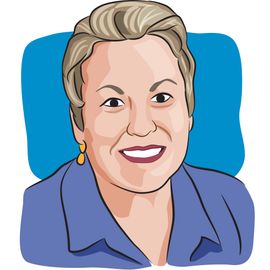- About Us
- Advertise / Support
- Editorial Board
- Contact Us
- CancerNetwork.com
- TargetedOnc.com
- OncLive.com
- OncNursingNews.com
- Terms & Conditions
- Privacy
- Do Not Sell My Information
- Washington My Health My Data
© 2025 MJH Life Sciences™ and CURE - Oncology & Cancer News for Patients & Caregivers. All rights reserved.
Am I a Cancer Survivor?

Kathy LaTour is a breast cancer survivor, author of The Breast Cancer Companion and co-founder of CURE magazine. While cancer did not take her life, she has given it willingly to educate, empower and enlighten the newly diagnosed and those who care for them.
What we are called is important to those who give a name power. But the reality is that we are survivors.
Last week, I met some cancer survivors in California while there to give a talk on how to thrive after cancer. Before I arrived, one of the attendees asked the planner when she could call herself a survivor. She said she had never figured out if she was a survivor or if not and when survivorship started.
Well, it starts the day you hear the word “cancer,” but I can understand the confusion.
A lot of the language about survivorship has only come into being in the past 20 years, and while that may sound like a long time, in the medical world it is a blink. Before the 90s, people called us cancer victims, one label we were all eager to get rid of. “Victim” says we are not in control of our lives and that cancer is in control. When the National Coalition for Cancer Survivorship was created in 1986, one of their first actions was to proclaim us to be survivors from the day of diagnosis and for the rest of our lives.
I know many cancer patients balked at that because they said they didn’t want to call themselves survivors until they had finished treatment and were in remission. It also made it hard for those of us who wrote about patients to distinguish if we were writing about the time during treatment or immediately after. And if it was after, how long.
Then there were the patients who ended up staying on treatment due to a chronic diagnosis, and those who resumed treatment when their cancer recurred. They didn’t feel like survivors and wanted to be called something else. This may all sound insignificant, but I have heard some heated discussions about language and what survivors want to be called. We have little enough control as it is, and deciding if we are “survivors” or “thrivers” or “people with cancer” is our call. But we have to recognize that the cancer community will do what they want, and most everyone followed NCCS definition beginning in the mid 80s.
Over the years, the term has evolved as the medical pros began to identify more about cancer survivorship. The assigned labels for survivorship were divided into acute survivorship, the time directly around diagnosis; transitional survivorship when treatment ends and the patient begins watchful waiting to see if the cancer returns; extended survivorship when a patient either begins to live cancer free or experiences a recurrence; and finally permanent survivorship when patients will either live a cancer free life or become chronic survivors with any of a number of long term or late effects such as fatigue, a second cancer or ongoing responses to treatment.
Overall, it just makes sense to live life to the fullest no matter what someone wants to call us, because cancer can’t stop that no matter how hard it tries.
But also know, that if you have heard the word “cancer” you are a survivor — one of the millions in this country.
